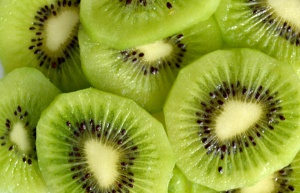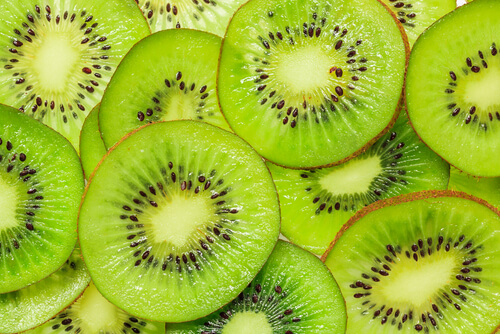Discover 9 Secret Health Benefits of Kiwi


Reviewed and approved by the pedagogue in physical education and nutritionist Elisa Morales Lupayante
They’re called “kiwis” because of their similarity to the bird of the same name, which is very popular in Oceania. A kiwi is more than just a delicious fruit with a flavor that’s a perfect combination of banana, strawberry, and pineapple. Today, we’re going to tell you about some of the secret health benefits of kiwi.
Benefits of kiwi: antioxidants and vitamin C
These are the two main nutrients in kiwi. It has 98 mg of vitamin C per 100 grams, which is more than oranges and lemons (almost double). Guavas and redcurrant are the only fruits that have more that. One piece of kiwi contains more than 80% of an adult’s daily value of vitamin C.
We suggest eating it in the morning for breakfast. Some of its properties include: a boost to vitamin C, lowered hypertension, and prevention of cancer, allergies, and colds.

Vitamin C is a powerful antioxidant. Its ability to neutralize free radicals makes kiwi a perfect neutralizer of any kind of harm to the body, especially things that have to do with aging. Eating this fruit keeps your cells younger and keeps your body healthy in general.
We suggest this for smokers, people who drink a lot of alcohol, people with diabetes or allergies, pregnant women, the elderly, people with fractured bones or torn ligaments, women in menopause, people with vision problems like cataracts, and people who have immune deficiency diseases like AIDS or herpes.
Read more: Foods That Can Help You Quit Smoking

More benefits of kiwi
It reduces stress and nerves
Kiwi is a great fruit for modern times. Due to the huge amount of vitamin C, it can help with nervousness and anxiety. It’s also great for reducing stress. It allows you to feel calmer and face the problems or the obstacles come into your path. Doctors recommend eating a kiwi before a job interview or an important meeting to reduce tension.
It reduces constipation
Kiwi has a lot of soluble fiber, a substance that helps digestion and improves the intestinal system. This is why it prevents constipation. It will especially help you with this issue if you eat it for breakfast. You can eat it with other fruits, yogurt, or cereal in the morning. It boosts bowel movements.
It helps with weight loss and reducing rid of fluid retention
Because of its high percentage of water and average calorie content (63 kcal per 100 grams), eating kiwi helps you to lose weight and feel more satisfied. It also doesn’t have a lot of sodium, which makes it perfect for weight loss diets and to get rid of water, especially for pregnant women. Kiwi is very diuretic and should not be missing from the diet of those who are obese or overweight. It is useful in cases of cardiac or liver failure.
Learn more: The Japanese Diet: Healthy Oriental Food for Weight Loss
It helps you digest
Like we mentioned, one of the greatest benefits of kiwi is that it’s good for digestion and helps your body break up the protein in food and prevent indigestion, gastritis, and gas. These proteins make it okay to combine kiwi with milk or gelatin.
It improves circulation
Because it has vitamin E and Omega 3 and 6 fatty acids, kiwi thins the blood, which improves the general state of the arteries. This keeps thrombus and clots from forming in the blood vessels. That means that it can help prevent thrombosis, chest angina, strokes, and heart attacks. On top of all that, the fiber in kiwi can reduce cholesterol levels in the blood.
It improves bone health
This includes any bone in the body, which means it’s also good for the teeth. This is thanks to the copper, magnesium, and potassium in kiwi. One piece of kiwi has about 10% of your daily value of all three. They’re extremely important because they improve bone development and nerves, muscles, and organ functioning.
It boosts the immune system
You can avoid colds and increase your defenses thanks to the folic acid and vitamin C in kiwi. They both help you produce more red and white blood cells and antibodies, which act as a barrier against viruses.
It fights anemia
This is also thanks to its vitamin C, which boosts your body’s ability to absorb iron. Eating kiwi is a good way for anyone with anemia or iron deficiency to speed up their recovery time.
It filters the sun’s rays
This is the last of the secret benefits of kiwi that we’re goign to talk about today. If you’re very sensitive to UV rays, you should definitely try eating kiwi. The Lutein in it (also present in algae, broccoli, and spinach) is like a natural protective filter for the skin.
Who can’t eat kiwi?
People that are allergic to an enzyme called proteolytic actidin can’t eat kiwis, papaya, or pineapple. People that tend to develop kidney stones can’t either, because it’s rich in calcium oxalates. For this reason, children should reduce their consumption, but not completely eliminate it. Its potassium content also makes it unadvisable for anyone who has had kidney failure.
The symptoms of kiwi poisoning include urticaria, difficulty swallowing, and vomiting.
All cited sources were thoroughly reviewed by our team to ensure their quality, reliability, currency, and validity. The bibliography of this article was considered reliable and of academic or scientific accuracy.
- Anaphylaxis U.K. (s. f.). Kiwifruit allergy: the facts. Consultado el 19 de abril de 2023. https://www.anaphylaxis.org.uk/fact-sheet/kiwifruit-allergy-the-facts/
- Bayer, S. B., Heenan, Ph., Frampton, Ch., Wall, Ch. L., Drummond, L. N., Roy, N. C., & Gearry, R. B. (2022). Two gold kiwifruit for effective treatment of constipation in adults. A randomized clinical trial. Nutrients, 14(9), 4164. https://www.ncbi.nlm.nih.gov/pmc/articles/PMC9572406/
- Carr, A. C., & Maggini, S. (2017). Vitamin C and immune function. Nutrients, 9(11), 1211. https://www.ncbi.nlm.nih.gov/pmc/articles/PMC5707683/
- Centros para el Control y la Prevención de Enfermedades. (2022). Conceptos básicos sobre el ácido fólico. Consultado el 19 de abril de 2023. https://www.cdc.gov/ncbddd/spanish/folicacid/about.html
- Duttaroy, A. K. (2013). Cardioprotective properties of kiwifruit. Advances in Food and Nutrition Research, 68, 273-82. https://pubmed.ncbi.nlm.nih.gov/23394993/
- Food Data Central. (2019). Kiwi fruit, raw. Consultado el 19 de abril de 2023. https://fdc.nal.usda.gov/fdc-app.html#/food-details/2344734/nutrients
- Harvard T. H. Chan. (s. f.). Antioxidants. Harvard School of Public Health. https://www.hsph.harvard.edu/nutritionsource/antioxidants/
- López-Sobaler, A.M., Aparicio Vizuete, A., & Ortega Anta, R.M. (2016). Beneficios nutricionales y sanitarios asociados al consumo de kiwi. Nutrición Hospitalaria, 33(4), 21-25. https://scielo.isciii.es/scielo.php?script=sci_arttext&pid=S0212-16112016001000006
- National Institutes of Health (NIH). (2022). Folato. Consultado el 19 de abril de 2023. https://ods.od.nih.gov/factsheets/Folate-DatosEnEspanol/
- Piskin, E., Cianciosi, D., Gulec, S., Tomas, M., & Capanoglu, E. (2022). Iron absorption: factors, limitations, and improvement methods. ACS Omega, 7(24), 20441-20456. https://www.ncbi.nlm.nih.gov/pmc/articles/PMC9219084/
- Richardson, D. P., Ansell, J., & Drummond, L. N. (2018). The nutritional and health attributes to kiwifruit: a review. European Journal of Nutrition, 57(8), 2659-2676. https://www.ncbi.nlm.nih.gov/pmc/articles/PMC6267416/#CR1
- Sivakumaran, S., Huffman, L., Sivakumaran, S., & Drummond, L. (2018). The nutritional composition of Zespri SunGold kiwifruit and Zespri Sweet Green kiwifruit. Food Chemistry, 238, 195-202. https://pubmed.ncbi.nlm.nih.gov/28867093/
- St. Jude Children’s Hospital. (2022). Anticoagulants (blood thinners) and vitamin K. Consultado el 19 de abril de 2023. https://together.stjude.org/en-us/patient-education-resources/support-daily-living/anticoagulants-and-vitamin-k.html
This text is provided for informational purposes only and does not replace consultation with a professional. If in doubt, consult your specialist.








